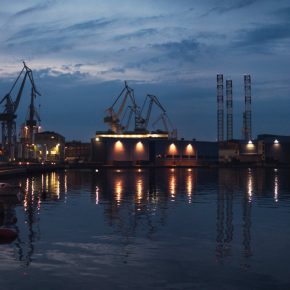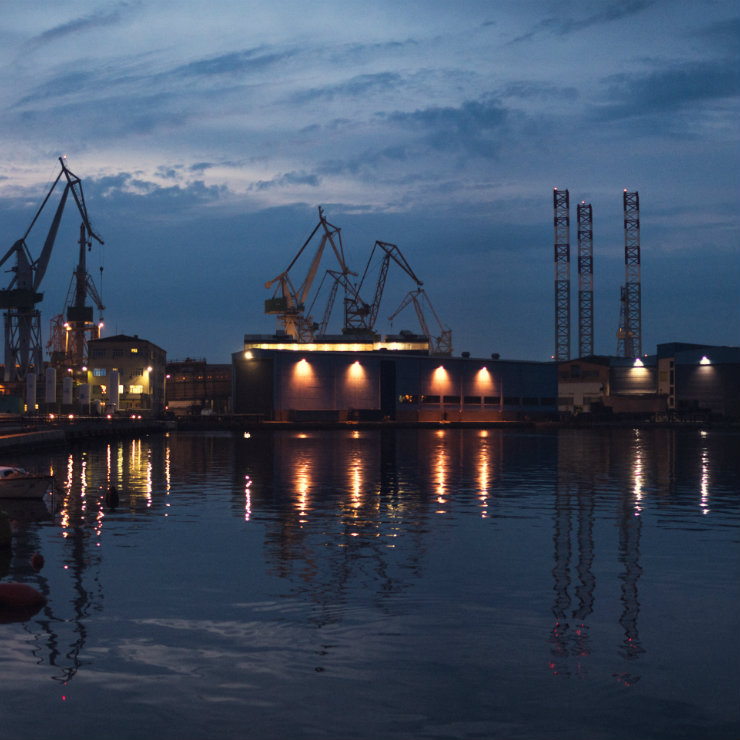Tydzień w gospodarce
Category: Trendy gospodarcze
Analyst, journalist specializing in the Western Balkans and Middle East domestic and foreign affairs

Uljanik shipyard, Croatia (Matej Duzel, CC BY-NC-ND)
In Croatia, shipbuilding is a very important industrial sector, regarding the share of employment (2-5 per cent, with subcontracts up to 10 per cent) in GDP (0.8-1.8 per cent) and exports (10-15 per cent). A large part of the population of individual regions (Istarska, Primorsko-goranska, Splitsko-dalmatinska County) is employed in this sector. The process of privatization and restructuring of Croatian shipyards should enable them to work on the international shipbuilding market and in accordance with market principles, all in line with existing EU rules and regulations.
The expected revival of Croatian shipbuilding to should contribute a large extent to regional and social stability, as well as strengthen the national economy, especially in several major shipyards: Uljanik in Pula (est. 1856); 3. Maj in Rijeka (est. 1906), Brodosplit in Split (est. 1922), Brodotrogir in Trogir (est 1944), Kraljevica (est. 1729).
Ships built in Croatia have always been identified in demanding world market by their quality, as well as by innovative design solutions (over 95 per cent of projects are designed and manufactured in Croatia and represent the heart of the shipbuilding industry system). In the last 30 years (beginning in 1987), Croatian shipyards have received international recognition for the quality of their built ships. A total of 40 acknowledgments for ships built („Ship of the Year”) were awarded for the innovation of design solutions, the quality of construction and the significance of constructed ships in international contexts. There are also 35 smaller companies and shipyards dealing with various products – from yacht construction and production, to construction and production of other types of vessels, which in a certain way have been in the shadow of big shipyards. There is a flurry of small shipbuilders, who are very active exporters and actively develop their production, employing a significant number of people and carrying out all their activities independently, without the support of the state.
Since 2011, however, Croatian shipyards are unprofitable, ineffective and pose a threat to state finances. Over the past 20 years, no serious scientific or professional work has emerged, nor a more thorough discussion of funding and financial sustainability of shipyards in Croatia has been launched. Discussions on the necessity of shipbuilding restructuring have been conducted largely between governments and trade unions, but without specific conclusions, data or vision of long-term problem solving.
A big hope emerged in 2015, when Croatian shipbuilding returned on the scene, with 44 new ships worth then USD1,75bn and Croatia was the 10th country in the world by number of demands, and second to Romania in Europe (in comparison, in August 2015 Russia was 4th, Poland 8th and Serbia 9th in Europe by number of demands).
In 2018, the shipbuilding crisis returned. Big ships continue to be produced, but every single one generates loss, the number of workers increased, but no investments have been made in modernization, etc. In addition, the book of orders has been filled with irrefutable new demands, and the shipyards do not have the financial and human resources to deliver contracted work on time, which is why they are charged with expensive penalties. Among few good examples Brodosplit stands out, its owner behaves like a real investor. It is evident that Mr Tomislav Debeljak well assessed the market and abandoned the established practice of tanker construction, focusing on smaller production of more complex vessels, and expanded shipyard activities and other product assortments. Financial reports show that the Split shipyard is stable, although the number of current orders is difficult to meet, and it will take several years to assess whether it will be able to cope with world competition.
The ship as a complex technological product that can be compared with the airline industry. Shipbuilders that are a part of the world market have the right to say that they are world’s technological top. Shipbuilding is not just a shipyard, but also all equipment manufacturers, faculties, schools – shipbuilding is a wider social community. The European Union has laid down very strict rules on the market for its shipbuilding industry while, at the same time, the situation on the world shipbuilding market is dictated by their far-off competitors, namely China, whose shipbuilding industry has almost inexhaustible sources of state financial aid. The complete suspension of state aid so far, in Croatia and elsewhere, after the crisis in 3. Maj and Uljanik, is starting to show off also in Brodotrogir, where the wages began to lag. Such a complex business mechanism, the construction of ships measured in dozens and hundreds of millions of EUR, without quality financial monitoring is simply impossible to realize.
According to the European Commission guidelines, shipyards can count on state guarantees for loans and advances to customers up to 80 per cent of the required amount. It is precisely on this principle that shipyards in other European countries operate, just as their governments have transposed into Guarantee Programs, documents specifying exactly who can, under what conditions and for what use enjoy the state guarantees. Such documents are subject to approval by EC administration, with clear compliance with guidelines. In this way, European shipyards do not have to go to specific ministries and government for each contracted project or ship, the line of government guarantees is automatically executed according to the clear rules of the game.
The Croatian Government has not yet issued such a document, although the proposal of the Guarantee Program was drafted by HB-Jadranbrod (association of Croatian shipyards) and discussed in the Ministry of Economy. For further operation of the shipbuilding industry, accepting such a document is an imperative. Continuing financial monitoring of newly-launched ships and approval of new state guarantees, in line with EC guidelines, is a key measure without which no major Croatian shipyard will be able to survive. It is a zero point, from which it goes further or ends. There is also a whole range of other measures that the Croatian state should introduce, just as ones used in Germany, Italy or Finland. The problem is, however, that the shipbuilding industry in Croatia is perceived through the prism of something inherited, something that happened, instead of being seen as the desirable industry that is systematically modernized.
Croatian government has announced that it will be involved in the development of a Shipbuilding Fund Guarantee Facility, which will allow financing shipbuilding for large, medium and small shipyards, based on good examples from countries such as: Germany, Poland, Finland and Portugal. A help comes also from the European Investments Bank, which is ready to finance building of ecologically acceptable ships within the program of green shipbuilding; this finance is up to EUR750m. Brodosplit has already announced its polar area cruise ship production, with high ecological standards.
There is an evident unsustainability of the current situation in Croatian shipbuilding. Such a situation requires finding survival modalities and profiling on the market, which cannot be achieved within the present orientation of major shipyards. The problem is high production orientation to the segment of medium-sized vessels, due to the fact that the most important producers in this segment are South Korea and Japan, and Croatian shipyards cannot offer prices at the South Korean level. That is why they should use the EU regulations in divestment of production on the segment construction of the most complex types of ships that are typical for shipbuilding in the European Union countries, which at the same time achieve far higher prices on the world market. The problem is complex and requires organizational, technological and manufacturing changes. Efficiency of shipbuilding includes ensuring the most favorable purchase of the required material; optimizing each processes and planning of all operations with the aim of ensuring uninterrupted flow of materials and optimum utilization of available resources.
After unsuccessful restructuring programs Croatian shipbuilding industry should be finally completely privatized. Privatization does not necessarily have to be a negative process, but given the past Croatian experience there is a fear that it will cause the loss of another traditional industry. The final effects will depend on business strategy of the investor, and it has been shown that private owners can manage with its property better than the state.
Vedran Obućina is an analyst and a journalist specializing in the Croatian and Middle East domestic and foreign affairs. He is the Secretary of the Society for Mediterranean Studies at the University of Rijeka and a Foreign Affairs Analyst at The Atlantic Post.

